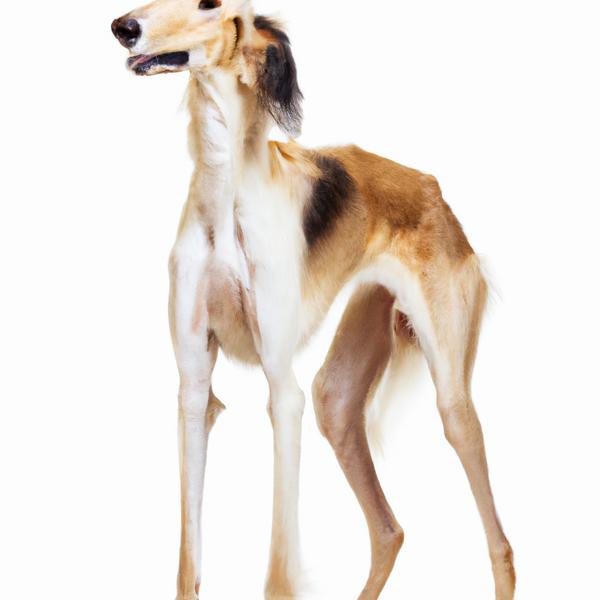Saluki
also known as Gazelle Hound, Persian Greyhound

 History
History
The Saluki, also known as the Royal Dog of Egypt, is a breed of sighthound that has a rich history dating back to ancient times. The breed is believed to have originated in the Fertile Crescent, an area that encompasses parts of modern-day Iraq, Syria, and Iran. The Saluki is one of the oldest known breeds of domesticated dogs, and evidence of the breed has been found in ancient Egyptian tombs and Mesopotamian art dating back to 2100 BC.
The Saluki was highly prized by the ancient Egyptians, who used them for hunting small game such as gazelles and hares. The breed was also considered sacred by the Egyptians, and it was believed that owning a Saluki would bring good luck and prosperity. The breed was also popular among nomadic tribes in the Middle East, who used them for hunting larger game such as deer and ibex.
In the 19th century, the Saluki was introduced to Europe and Britain. The breed quickly gained popularity among the upper classes, and was particularly favored by the British royal family. Queen Victoria was known to be a fan of the breed and owned several Salukis. The breed was also popular among British aristocrats, who used them for hunting on their estates.
In America, the Saluki was recognized by the American Kennel Club in 1927. The breed quickly gained popularity among American dog fanciers, and the Saluki Club of America was formed in 1927. Salukis were also used for hunting, and for lure coursing competition that is a sport where a mechanical lure is pulled across a field, and dogs chase after it.
The Saluki is a slender and elegant breed, with a long, silky coat that comes in a variety of colors including cream, fawn, red, and black and tan. They are a medium-sized breed and typically weigh between 40-70 pounds. The breed is known for its gentle and affectionate nature, and they make great family pets. They are also known for their endurance and speed, and are excellent for hunting and lure coursing.
Breed Information
Is Saluki a purebred?
Purebred
What were Salukis originally used for?
coursing hare and gazelles
How Long Do Salukis Live? What is average life expectancy for a Saluki? How long can Salukis live?
12-14 years
The average Saluki lifespan is somewhere between 12-14 years, provided they aren't beset by any exceptional health issues or injuries.
Saluki Height & Weight
How big is a full grown Saluki?

| Height | ||||
|---|---|---|---|---|
| Average | 6 months | 12 months | 18 months | |
| Male | 23-28 inches (58.4 - 71.1 cm) | 18.5 inches (47 cm) | 23.5 inches (59.7 cm) | 25.5 inches (64.8 cm) |
| Female | 23-24 inches (58.4 - 61 cm) | 18.0 inches (45.7 cm) | 21.0 inches (53.3 cm) | 23.5 inches (59.7 cm) |
| Weight | ||||
|---|---|---|---|---|
| Average | 6 months | 12 months | 18 months | |
| Male | 45-65 pounds (20 - 29 kg) | 27.5 pounds (12 kg) | 42.5 pounds (19 kg) | 55.0 pounds (25 kg) |
| Female | 35-45 pounds (16 - 20 kg) | 24.0 pounds (11 kg) | 35.0 pounds (16 kg) | 40.0 pounds (18 kg) |
Do Salukis get fat easily?
![]()
![]()
![]()
![]()
![]()
The Saluki is a dog breed that has a low risk for obesity. This means that they are less prone to gain weight than many other breeds, but it is still important to monitor their food intake and ensure they get enough exercise to maintain a healthy weight and overall well-being.
Are Salukis Hypoallergenic?
No
Unfortunately, the Saluki is not hypoallergenic, making it not a good choice for a dog lover who suffers from pet allergies.
What is a Saluki personality? What are Saluki dogs best known for?
Aloof
Quiet
Loyal
Intelligent
Reserved
Are Salukis heavy shedders? How Much Does a Saluki Shed?
![]()
![]()
![]()
![]()
![]()
Saluki will shed a negligible amount of hair. Some owners say that they do not shed, but that is not true. But the amount of shedding can be rather light than other dog breeds. If you do not want to deal with the hairs flying around in your home, then this breed is a perfect choice for you.
What is the watchdog ability of a Saluki dog?
![]()
![]()
![]()
![]()
![]()
The Saluki dogs are average watchdogs. If they sense something different, this breed will alert their owner.
Breed History
Where do Salukis come from?
Middle East
What are Salukis descended from?
sighthound, greyhound-like dog
When were Salukis first bred? How old is the Saluki breed?
2100 BC
What Breed Group is a Saluki?
Hound (AKC:1929)
Sighthounds & Pariahs (UKC)

Saluki Appearance
What color are Saluki eyes?
Brown
What color can Saluki nose be naturally?
Black
What color can Saluki coat be naturally?
White
Fawn
Cream
Red
How long is a Salukis coat?
![]()
![]()
![]()
![]()
![]()
The coat of a Saluki falls in the medium length category.
How Dense Is The Saluki Coat?
![]()
![]()
![]()
![]()
![]()
What is the texture of the hair of a Saluki?
Straight
How many puppies can a Saluki have in a litter? How many puppies can a Saluki have in her first litter?
12-14 puppies per pregnancy
A Saluki can have a litter of 12-14 puppies on average. However, it's worth noting that the size of the litters can vary greatly. Factors that can influence litter size include the health of the mother, breeding history, and genetics.
![]()
![]()
![]()
![]()
![]()
Salukis are known for their adaptability and versatility, they are capable of adapting well to a wide range of lifestyle changes and living environments. They are a highly adaptable breed, and make great companions for families and individuals of all lifestyles.

Saluki Health Issues
Do Salukis have a lot of health problems?
![]()
![]()
![]()
![]()
![]()
The Saluki is generally considered to be healthy. However, like all breeds, they are susceptible to certain health issues and it is important to keep an eye out for them and address them with your veterinarian as needed.
What are the major health concerns to be aware of when owning a Saluki?
Heart Problems
Cancer
What are the less significant issues to keep in mind when it comes to Salukis?
Allergies
Anesthesia Sensitivity/Allergy
What are the occasional tests recommended for Saluki breed?
Cardiac
Blood Test
Physical Examination

Saluki Needs and Activities
Do Salukis have a lot of energy?
![]()
![]()
![]()
![]()
![]()
Salukis are high-energy dogs, thus an active lifestyle suits them well.
Do Salukis need socialization? How social are Salukis?
![]()
![]()
![]()
![]()
![]()
Salukis have average social needs compared to other breeds. They are known to be less active and independent than other breeds, and they are content with spending time alone and with their human family.
How much exercise should Salukis get?
![]()
![]()
![]()
![]()
![]()
The Saluki dog requires a moderate amount of physical activity to maintain a healthy lifestyle. These breeds are ideal for people who have a moderate amount of time to devote to their pet and enjoy regular physical activity themselves. They also make great family pets as they have the energy to keep up with children and the temperament to be great companions.
How much sleep should a Saluki have? Do Salukis sleep a lot?
![]()
![]()
![]()
![]()
![]()
Salukis are active dogs that don't require as much sleep as other breeds. However, they still need enough sleep to stay healthy.
Does a Saluki drool a lot?
![]()
![]()
![]()
![]()
![]()
The Saluki is a breed of dog that is characterized by its minimal drooling, making it an ideal choice for people who dislike drool marks on their clothing.
How much does it bark?
![]()
![]()
![]()
![]()
![]()
Saluki dogs tends to bark less frequently than most other dogs. They tend to be quieter and less vocal than other breeds. They may only bark when necessary, such as to alert their owner of something or to communicate something. They do not bark excessively, and may not bark as much as other dogs in certain situations, such as when they are left alone.
Do Salukis exhibit aggressive behavior to safeguard their home and territory? Do they possess a natural tendency to guard?
![]()
![]()
![]()
![]()
![]()
Saluki dogs are not known for their protective nature and may not be the best choice as guard dogs. They do not have a strong drive to defend their territory and may not be inclined to provide protection.
Are Salukis mouthy?
![]()
![]()
![]()
![]()
![]()
What is the likelihood of a Saluki running away? Do they have a tendency to explore or wander frequently?
![]()
![]()
![]()
![]()
![]()
Do Saluki dogs have a high prey drive?
![]()
![]()
![]()
![]()
![]()
What do Salukis enjoy doing? How do I keep my Saluki busy?
Jogging, Sniffing, Walking
What is the energy level of a Saluki? How much energy does a Saluki have?
Medium
Salukis are medium-energy dogs and typically enjoy socializing and playing casual or even sustained games of chase with other dogs. They may also have occasional periods of barking or racing around the house.
![]()
![]()
![]()
![]()
![]()
How far should a Saluki walk each week? How many miles should a Saluki walk every week?
9 miles / week
There's really no limit to how far you walk your dog as long as they're comfortable. For Saluki, it's at least 9 miles / week. Just remember to build distance and stamina gradually over time.
How much a Saluki should exercise a day? How much activity does a Saluki need?
60 minutes
In general most Salukis usually need at least 60 minutes of exercise daily. This can be spread across the day and include all sorts of high-energy activities, like walking, running and playing.
What level of grooming should be provided for a Saluki?
![]()
![]()
![]()
![]()
![]()
The Saluki is a breed of dog that does not require extensive grooming.
How often should you brush a Saluki?
Weekly
Saluki should be brushed at least once a week. Of course you can give them more frequent brushes if you find that they are still shedding a lot
What are the most commonly used brushing tools for Salukis?
Slicker Brush
Comb
Nail Clipper
Costs
How many cups of food does a Saluki eat?
3 cups
For an average 45-65 pound (20 - 29 kg) Saluki feed 3 cups daily. But, keep in mind, the amount you feed is going to be dependent on the quality of the food you are feeding.
How Much Does a Saluki Cost Daily?
$1.70 - $2.00 / day
The average cost of a Saluki is somewhere $1.70 - $2.00 per day.
How Much Does a Saluki Cost Per Month?
$48 - $63 / month
The average per month expenses of a Saluki is between $48 - $63. This makes an average of $576 - $756 per year. It will be on the higher side when the dog is still small because it will need more frequent visits to the vet, shots.
Saluki Characteristic
How intelligent is a Saluki?
![]()
![]()
![]()
![]()
![]()
Salukis has average obedience intelligence. But, they're also independent thinkers. The Saluki is a breed with an exceptionally high IQ and may get into mischief if left to their own devices.
How sensitive is a Saluki dog?
![]()
![]()
![]()
![]()
![]()
This dog breed is particularly attuned to its environment and the emotions of those around it. It can be easily overwhelmed by loud noises, new environments, and unfamiliar people or animals. This dog is best suited for individuals or families who are patient, gentle, and understanding of its sensitive nature. It may also benefit from a calm and stable home environment, with a consistent routine and plenty of positive reinforcement training.
Are Saluki dogs affectionate?
![]()
![]()
![]()
![]()
![]()
Do Saluki do well in apartments? Are Salukis good indoor dogs?
![]()
![]()
![]()
![]()
![]()
Salukis are known for being excellent apartment dogs. They are fairly active indoors and will do okay without a yard.
Are Salukis good with kids? Are Salukis good around children?
![]()
![]()
![]()
![]()
![]()
Salukis are kid-friendly dogs. They are good with children and excellent dogs with children if they are socialized and trained at a young age.
Are Salukis good for elderly?
![]()
![]()
![]()
![]()
![]()
Are Salukis good with cats? How friendly Salukis are toward cats?
![]()
![]()
![]()
![]()
![]()
Salukis are below average friendly toward cats. But with the right training and socialization, Salukis can be good with cats,
Do Saluki dogs get along with other dogs? Are Salukis OK with other dogs?
![]()
![]()
![]()
![]()
![]()
Salukis are average friendly towards other dogs. If they are raised with other dogs, they are likely to get along with them. And, if they are socialized properly from a young age, they will usually be great with other dogs.
How do Saluki dogs interact with other pets? Are they considered pet-friendly?
![]()
![]()
![]()
![]()
![]()
Are Salukis friendly with strangers?
![]()
![]()
![]()
![]()
![]()
Salukis are average friendly around strangers. They can be wary around strangers and a little standoffish. Early socialisation is key.
Do Salukis like to play? Are Salukis playful?
![]()
![]()
![]()
![]()
![]()
Salukis have an average level of playfulness. The Salukis, like other dogs, like to play. But they are not the most playful dog breed.
Are Saluki easily trained?
![]()
![]()
![]()
![]()
![]()
Saluki dogs are known for their ease of training and ability to learn quickly, making them a popular choice for pet owners and trainers alike.
 Pros & Cons
Pros & Cons
Pros
- Active
Enjoys participating in activities such as running and hunting - Minimal to no shedding
The Saluki breed is known for having minimal to no shedding of hair. - Lack of odor
The Saluki is unlikely to have an unpleasant odor. - Rarely barks
If you're in search of a quiet breed, this one may be a suitable option as they are known for being quiet. - Affectionate
Loyal towards their owners, making them great companion dogs - Apartment Friendly
Saluki are well-suited for apartment living. - Maintain a healthy weight
Salukis have a low likelihood of becoming overweight. - Good with children and other pets
Making them a great family pet
Cons
- Not cat-friendly
It is unlikely that a Saluki will be comfortable around cats. - Not Hypoallergenic
Salukis may not be the best choice for those with allergies, as they may cause allergic reactions. - Not suitable for office environment
Salukis may find an office setting too stressful. - Exercise
Requires regular exercise and can become destructive if not given enough physical and mental stimulation